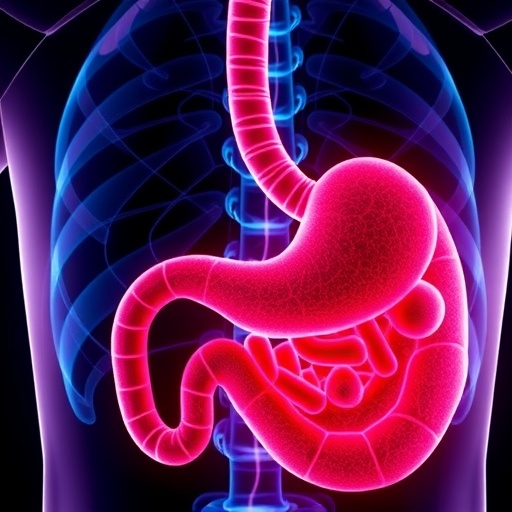In a groundbreaking advancement for gastric cancer treatment, researchers have reported promising outcomes using a novel combination of toripalimab, an anti-PD-1 monoclonal antibody, with the established FLOT chemotherapy regimen. This approach, explored in a phase II clinical trial, targets patients suffering from gastric cancer complicated by peritoneal metastasis—a notoriously challenging condition with a dire prognosis. The study, conducted in China and recently published in BMC Cancer, delves into whether this immunochemotherapy pairing could convert inoperable cases to operable ones, potentially rewriting therapeutic strategies for this aggressive malignancy.
Gastric cancer remains a global health challenge with high mortality rates, particularly when it metastasizes to the peritoneum, resulting in extensive disease diffusion and poor patient outcomes. Standard treatments have made modest strides, yet survival times have remained dismal. This trial’s focus on conversion therapy—a strategy aimed at shrinking tumors to allow for surgical removal—marks a significant pivot toward improving long-term survival chances in patients with previously inoperable tumors.
The trial enrolled patients between the ages of 18 and 80 who were laparoscopically confirmed to have peritoneal metastases from gastric cancer. Participants received a combined regimen of toripalimab at 3 mg/kg alongside the FLOT chemotherapy protocol every 14 days for up to four cycles. The FLOT regimen consists of docetaxel, oxaliplatin, leucovorin, and 5-fluorouracil, chemotherapeutic agents with synergistic cytotoxic effects. Following these initial cycles, patients considered fit underwent surgical resection. Postoperatively, four additional cycles of adjuvant therapy were administered to consolidate treatment responses.
The primary endpoint was the R0 resection conversion rate—the proportion of patients whose tumors could be completely resected with negative margins after treatment. Secondary endpoints included progression-free survival (PFS), overall survival (OS), and the safety profile of the combined regimen. Over two years, 24 patients with peritoneal spread were screened, with 20 meeting inclusion criteria and undergoing treatment.
The results of this study provide a glimmer of hope in an otherwise bleak landscape. The objective response rate—a measure of tumor size reduction—was 35%, while the disease control rate, encompassing partial responses and stable disease, reached an impressive 80%. Most notably, the conversion to R0 resection was achieved in 25% of patients, demonstrating that a quarter of previously inoperable cases became candidates for potentially curative surgery after treatment.
Further pathological examination of resected specimens revealed significant tumor regression grades, with 40% achieving TRG1, indicative of near-complete tumor necrosis, and the remainder TRG2, signifying substantial but incomplete tumor cell kill. These histopathological responses correlate strongly with improved prognosis and suggest robust activity of the toripalimab-FLOT duo against peritoneal metastases.
Survival metrics echoed these encouraging findings. The median progression-free survival stood at 6.5 months, while overall survival reached 10.8 months. While these figures may seem modest at first glance, they symbolize meaningful progress against a background where survival has traditionally been measured in mere months without effective systemic therapy.
Safety profiles, a critical consideration in combination regimens, revealed that 35% of patients experienced grade 3 or 4 treatment-related adverse events (TRAEs). Although significant, the toxicity spectrum was deemed manageable and consistent with known profiles for immunotherapy and FLOT chemotherapy, underscoring the feasibility of this therapeutic approach.
The underlying mechanism driving this synergy likely stems from toripalimab’s immunomodulatory action, which reinvigorates T-cell mediated anti-tumor immunity by blocking the PD-1 checkpoint. Chemotherapy, meanwhile, not only reduces tumor burden but may also induce immunogenic cell death, thereby enhancing immune recognition. This dual modality represents a paradigm shift in tackling tumors with complex metastatic behaviors like peritoneal dissemination.
This trial also underscores the vital role of laparoscopic assessment in staging and monitoring treatment response in gastric cancer with peritoneal involvement. By allowing direct visualization and biopsy, laparoscopy confirms metastatic spread, enabling precise patient selection for conversion therapy and timely evaluation of therapeutic efficacy.
Though the study is limited by its single-arm, open-label design and modest sample size, it provides compelling rationale for larger, randomized controlled trials to validate these findings. If corroborated, toripalimab combined with FLOT chemotherapy could become a new beacon of hope, extending survival and improving quality of life for patients confronted with the otherwise dismal prognosis of peritoneal metastatic gastric cancer.
Moreover, this research aligns with a broader trend in oncology, where immune checkpoint inhibitors are increasingly integrated with conventional chemotherapy to exploit complementary mechanisms of action. The success in gastric cancer may spur similar strategies in other cancers with challenging metastatic profiles, signaling a new era of multi-modality cancer therapeutics.
The trial’s registration in ClinicalTrials.gov (NCT04886193) reflects a transparent and systematic approach to clinical research, ensuring dissemination and accountability. It also facilitates tracking evolving data in this promising field, encouraging collaborative efforts to refine and optimize treatment paradigms.
In conclusion, the combination of toripalimab and FLOT chemotherapy exhibits clear potential as a conversion therapy for gastric cancer patients with peritoneal metastases. This strategy not only increased the rates of successful surgical resection but also contributed to meaningful survival benefits, substantiating the integration of immunotherapy into first-line treatment frameworks for this disease subset. Continued investigation will determine whether this approach can be widely adopted, ultimately transforming standards of care and patient outcomes worldwide.
Subject of Research: Evaluation of toripalimab combined with FLOT chemotherapy as conversion therapy in gastric cancer patients with peritoneal metastasis.
Article Title: Toripalimab combined with FLOT chemotherapy as conversion therapy for gastric cancer with peritoneal metastasis: a single-arm, open-label, phase II trial.
Article References:
Zhang, Z., Lin, Z., Xu, Y. et al. Toripalimab combined with FLOT chemotherapy as conversion therapy for gastric cancer with peritoneal metastasis: a single-arm, open-label, phase II trial. BMC Cancer 25, 1733 (2025). https://doi.org/10.1186/s12885-025-15166-w
Image Credits: Scienmag.com
DOI: 10.1186/s12885-025-15166-w (Published: 08 November 2025)




